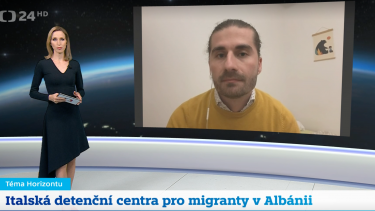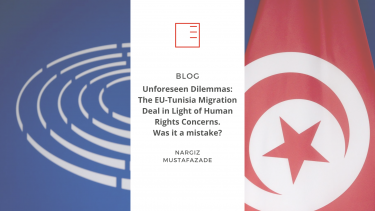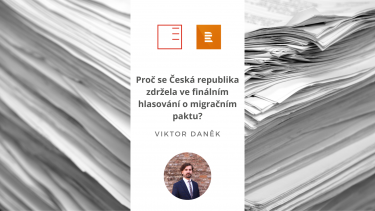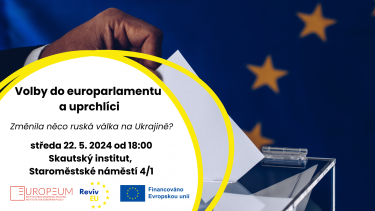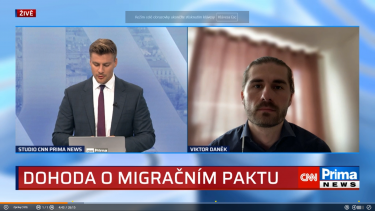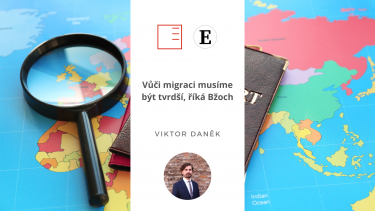Horizont ČT24 | Immigration centre in Albania
A large-scale immigration centre is to be operational in Albania from August. Rome is building it to take illegal migrants intercepted at sea out of its territory until the asylum process is completed. Critics say the plan is unfair to migrants because it will disproportionately prolong their stay in the European Union when they are assessed. Is this an effective solution or is it just part of Italian Prime Minister Giorgia Meloni's election campaign? Viktor Daněk, deputy director of EUROPEUM Institute, commented for Horizont ČT24.
Show moreBLOG | Unforeseen Dilemmas: The EU-Tunisia Migration Deal in Light of Human Rights Concerns. Was it a mistake?
Tunisia has become the main exit point for asylum seekers and refugees, especially those from sub-Saharan Africa. The EU, faced with a surge in arrivals to Lampedusa, has bolstered its cooperation with Tunisia, signing a Memorandum of Understanding with President Kais Saied. However, questions arise over the EU's handling of human rights abuses in Tunisia, reminiscent of past agreements with Turkey. Nargiz Mustafazade, a trainee in the Brussels office of EUROPEUM Institute, writes about this topic in her blog.
Show moreČRo | Czech Republic abstains in the final vote on the migration pact
The Migration Pact heads to its final vote in the Council of Ministers. The Czech Republic will abstain in this final vote. What is the process of approval within the European Union? What led to the change of position? And what are the implications for the EU of the just-approved migration pact? Viktor Daněk, Deputy Director of EUROPEUM Institute, comments for Czech Radio.
Show moreRevivEU | Did the Russian war in Ukraine change anything?
We invite you to a public podcast recording focusing on the discussion of changes in the Czech approach to refugees due to the Russian war in Ukraine. We will delve into shifts in Czech solidarity towards refugees and also discuss the new migration pact, its content, and significance.
Show moreCNN Prima News | EU member states confirm agreement on final migration pact
Representatives of the EU Member States in Brussels confirm their agreement on the final form of the migration package. The Czech Republic reportedly abstained from voting, while Hungary and Poland opposed it. Viktor Daněk, Deputy Director of EUROPEUM Institute, commented on the final form of the migration pact.
Show moreEkonomický deník | Migration problems are effectively eliminated by the new pact
The migration pact recently approved by the European Parliament brings a number of effective steps to prevent illegal migration, but it is certainly not a perfect anti-immigration tool, said Jaroslav Bžoch, candidate for MEP and vice-chair of the Foreign Affairs Committee and the European Affairs Committee of the Chamber of Deputies. Viktor Daněk, Deputy Director of EUROPEUM Institute, commented on the functioning of the EU Migration Pact and the opinion of the Czechs on this pact for Ekonomický deník.
Show moreiDnes.cz | What exactly is in the migration pact
The European Union has approved a migration pact, and from 2026 individual states will either accept their share of refugees or pay to opt out of this obligation. However, since the Czech Republic has already accepted a large number of refugees since the outbreak of the war in Ukraine, it should temporarily be exempt from this obligation. However, as noted by Viktor Daněk, deputy director of the Institute for European Policy EUROPEUM, this is not an exemption explicitly granted to Czechia. Exemptions are determined based on the number of people granted asylum or similar protection in a given country.
Show moreČT24 | The Migration Pact is about border protection, but it also brings new responsibilities
The European Parliament recently approved the Migration Pact, which, among other things, deals with the relocation of asylum seekers. Minister of the Interior Vít Rakušan claims Czechia will have an exemption from solidarity due to the number of Ukrainian refugees it accepted. The Migration Pact will take effect in two years, and its strengths and weaknesses were analysed by Viktor Daněk, Deputy Director of the EUROPEUM Institute.
Show moreCNN Prima News | European migration pact: does the Czech Republic have an exemption or not?
The Chamber of Deputies discussed the EU Migration Pact for over three hours. The opposition criticises the pact and claims that it indirectly introduces quotas. At the same time, there is uncertainty about the interpretation of a possible exemption. What does the pact stipulate and what impact could it have on the Czech Republic? Viktor Daněk, deputy director of the EUROPEUM Institute for European Policy, commented for Partie Plus on CNN Prima News.
Show moreNovinky.cz | Migration Pact: Non-compliance could lead to fines
The Migration Pact consists of ten legislative proposals that passed the European Parliament last week. They still have to be voted on in the Council of Ministers. Failure to comply with these regulations could lead to lawsuits and heavy fines. Viktor Daněk, Deputy Director of EUROPEUM Institute, commented on the Migration Pact for Novinky.cz.
Show moreStaroměstské náměstí 4/1
Prague 1 - Staré Město
110 00
tel.: +420 212 246 552
email: europeum@europeum.org
https://www.europeum.org
